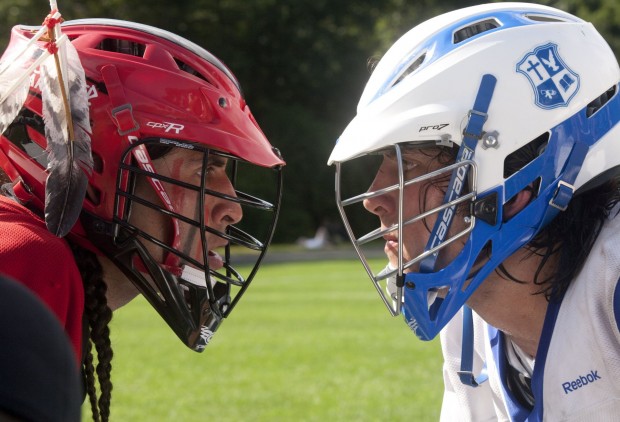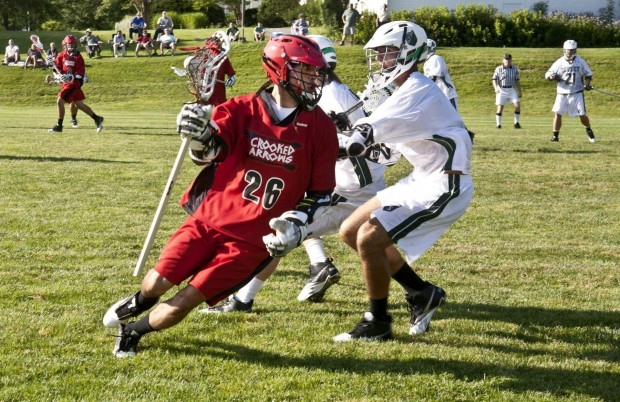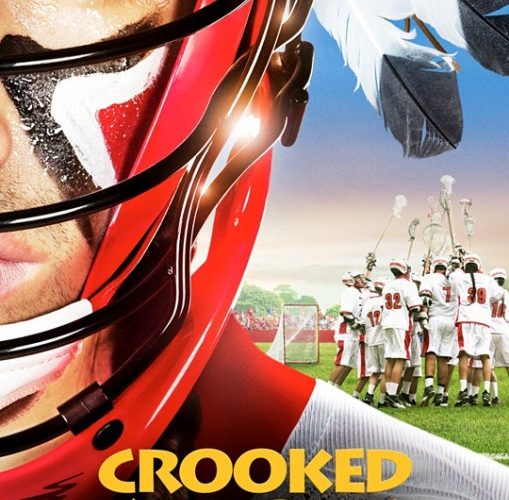Sports in films have been a cultural celebration, predating Leni Riefenstahl’s Olympia also owing its linage to Thomas Edison’s early experiments in motion. Crooked Arrows uses lacrosse as half an entrance into something more interesting: a portrait of an upstate New York tribe. The film falters where other sports movies have: growing too sentimental and a tad cheesy for its own good. Ruthless like Goon it is not – structurally it suffers from the same good intentions of contemporary Christian-based filmmaking.

Joe Logan (Brandon Routh) is a former lacrosse star and half-blood. He runs the business affairs of a small reservation casino, seeking to expand at the hands of Mr. Geyer (Tom Kemp), a developer who is, above all things, all about the benjamins. In exchange for transferring additional tribal land to the private corporation, Joe, a tribal liaison that drives an Audi convertible and sharp suites, is ordered into a spiritual quest. He must return, as his tribal elder father (Gil Birmingham) calls it, to the “creator’s game.” Joe’s sister, Nadie (Chelsea Ricketts) is off the field from a broken leg and serves as an assistant coach.
Joe’s spiritual journey isn’t terribly intense: the team makes it to the playoffs as expected, guided not by spirits in the present but of the past. Here is where a more powerful film would have contained moments of quiet meditation, landscapes and the passage of time. I dislike overt message films that can’t break for reflection, a pet peeve I’ve always had with faith-based cinema.
Sports are our way into a story, which contains some details of living within sovereign nations. However, the film’s ethnographic ambitions are minor (I was reminded of a far more fascinating institutional study, Rob Hardy’s The Gospel from 2005). Crooked Arrows is professionally made, directed by Native American outsider (although the credits indicate the film was produced by the Onondaga Tribe, which I assume wrote some of the checks) Steve Rash. Rash’s last theatrical release was the spirited Jamie Foxx/Nia Long comedy Held Up, and he brings an energy that is perhaps right for a sports film, but wrong for a heritage film. The film can have it both ways, but doesn’t in its present form.

The audience for the film is lacrosse fans and players; in fact the film (which notes this by way of an obnoxious announcer who is podcasting these high school games), features top lacrosse players in cameos. Perhaps this is who the movie is made for, but as a celebration of the history and heritage of lacrosse (as its opening moments imply) it’s too watered down. There have been contemporary sports heritage films that have been more effective, including Rob Lieberman’s Breakaway, the story of a Punjabi hockey team in contemporary Toronto, which doesn’t arrive with the same baggage Crooked Arrows has.
It is a shame, there’s so much interesting material on the periphery and that’s a major problem elevating it past a simple (and uninteresting) sports film. Whereas Breakaway uses Hockey (iconically Canadian), an adopted past time, as a result of immigration, Crooked Arrows past is ever-present. A road film is not about the destination, it’s about the journey. A sports movie must end with a big playoff – but its journey and setting are so rich. Why couldn’t Rash’s camera stray away from the lacrosse field just a little longer? We’ve seen this story before, but what’s going on off-field is more interesting and tragically underrepresented. Perhaps a Hollywood filmmaker wasn’t the right choice for this material.
Crooked Arrows is now in limited release.

